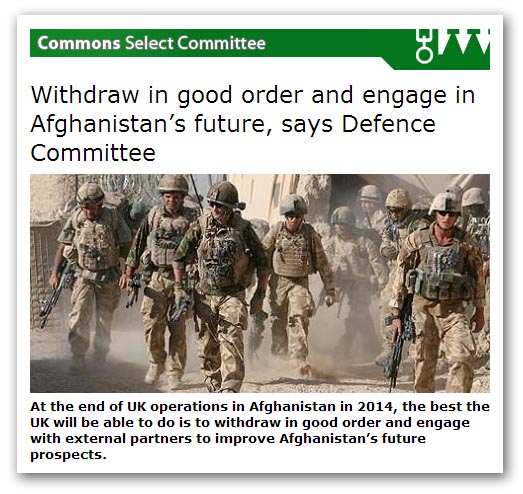How appropriate it also is, therefore, that yesterday saw the publication by the Defence Select Committee of a report which effectively admits defeat, the admission of which was drowned out by the media incontinence over the death of the "Iron Lady".
Barely covered by the media then, we had the Committee declare that, "At the end of UK operations in Afghanistan in 2014, the best the UK will be able to do is to withdraw in good order and engage with external partners to improve Afghanistan's future prospects".
And if that is the "best" that we can hope for, the worst does not even bear thinking about – chaotic retreats from Afghanistan tend to be expensive and deadly. Our loss of prestige and influence is bad enough without that to add to the loss.
The worst of it though is that, as far as the Defence Committee goes, it has learned little from the experience of over six years of war. It is for the Afghan people themselves to determine their own future, says Committee Chairman, James Arbuthnot.
According to the committee, securing the future of Afghanistan thus requires the concerted efforts of all the Afghan people, and only then to we see a role for the regional neighbours, with Pakistan singled. The USA; NATO and other coalition partners play a very much subsidiary role.
But, in coming to this conclusion, the Committee ignores the counsel of its own star witness, Sir Rodric Braithwaite, former Ambassador to the Soviet Union. "The Pakistanis and the Indians are the key", he told members in his oral evidence, having already told them that, if the Indians and Pakistan behaved differently and were prepared to agree with one another on how they should treat Afghanistan, a lot would change.
It says a great deal of the inadequacy of the Committee that it did not even take the time out to ask Sir Rodric why he thought the combination of India and Pakistan were so important, and nor did they inquire as to how the Indians and Pakistan should behave. These weighty matters were left unexplored.
For all its 228 pages, therefore, the Committee report leaves an intellectual vacuum, offering nothing bankable and no political guidance to government which might serve to reduce the chances of civil war – the most expected outcome following departure of coalition forces.
Into that vacuum, however are stepping two of the major regional player, China and India, which next week are meeting in Peking for talks on the security situation.
Traditionally, we are told, these two nations they have been on opposing sides of Afghanistan's "Pakistan divide". China has preferred to outsource its Afghanistan policy to its close ally, Pakistan.
But in recent years Pakistan's activities have led China to hedge its own strategy in that country. Pakistan's close ties with the Taliban, its insistence that the Taliban should be in power in Afghanistan and its almost overt support to terrorism has scared the Chinese, say Indian sources.
This partisan analysis will do nothing to calm the paranoia of the Pakistani military, which is never very far from the surface at the best of times.
Written evidence from professor Michael Clarke, Director, Royal United Services Institute (RUSI) explains why this is not a happy move. For the worst to be avoided, he argues that Pakistan and India must recognise a common interest in the stability of Afghanistan and "refrain from antagonistic competition in the country".
Yet, India cosying up to China will be seen by Pakistan exactly as an extension of Indian provocation which has done much to fuel the war. On the other hand, as long as India treats Afghanistan as a strategic back door, aimed at destabilising Pakistan and keeping it off balance, the Pakistanis will seek to control Afghanistan through their proxies, the Jihadist Taliban.
Thus, we are back to the same, unresolved scenario, where no progress can be achieved until India and Pakistan can be brought to the negotiating table to discuss a settlement of their own enmities, the core of which is the fate of Kashmir.
Any adequate political appreciation of the conflict in Afghanistan would recognise this need, but that is not something which has occurred to the Defence Committee. One always felt that MPs, if they did their jobs properly, were worth their salt, but here lies yet another example where they prove to be a waste of space.
COMMENT THREAD
